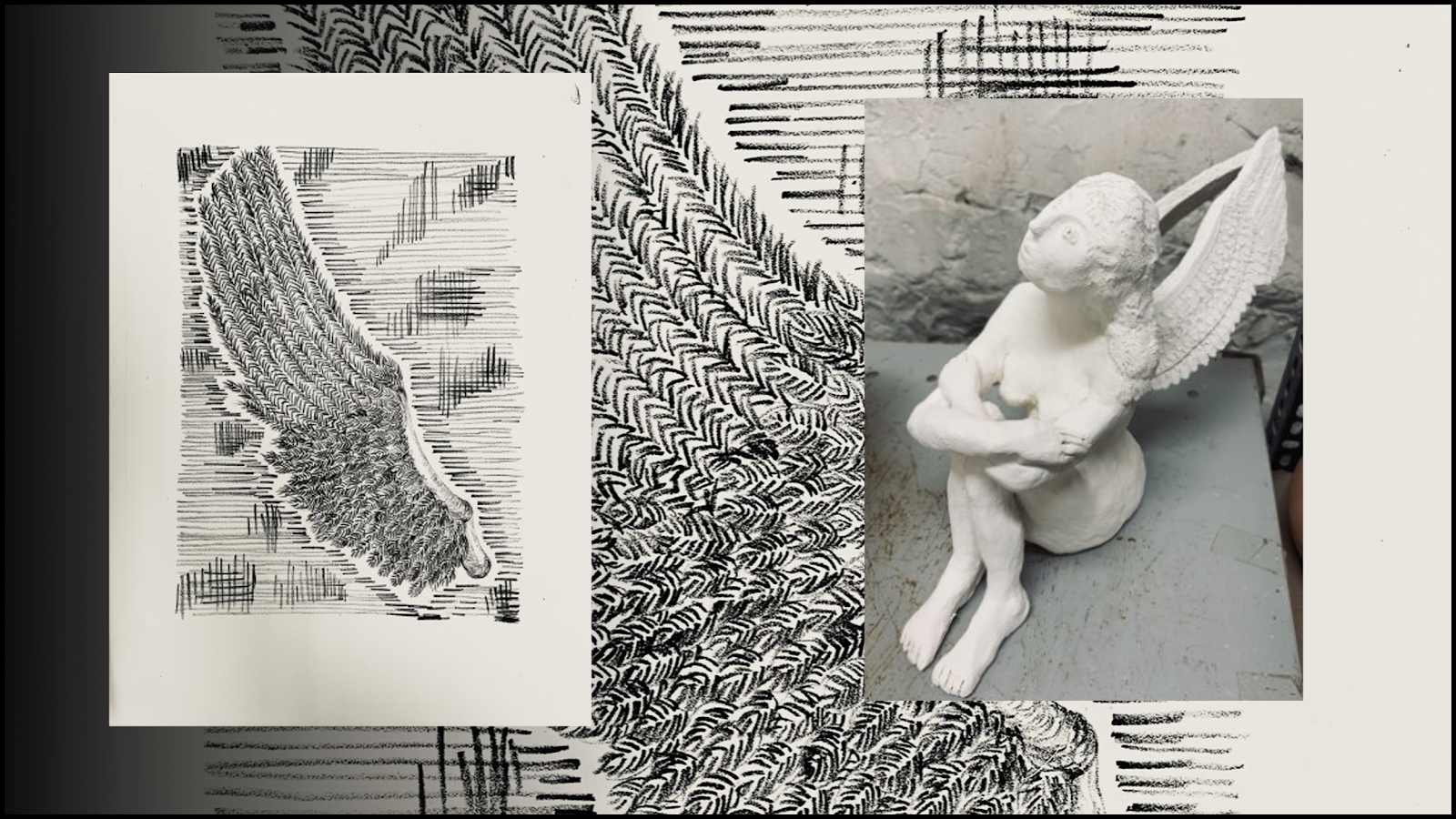An Idea Takes Flight: “Hope”
Let me introduce you to ‘Hope.’ A ceramics figure with wings, she is one of several elements of a future installation piece which takes its name from the Emily Dickinson Poem entitled, ‘” Hope” is the thing with feathers”. An extended metaphor, the poem speaks to hope being a bird which is always sitting in our souls. This bird always sings when inspiration is needed in one’s life. I think this is something we need to be reminded of especially during these turbulent times (see poem below).
In my installation piece, ‘Hope’ sits within a whimsical bird cage. Her gaze is caught by a bird ‘hovering’ nearby (a ceramic piece hanging by a clear thread). Her gaze is one of quiet contemplation, a smile just playing at her lips, and she appears to be considering how she may join the bird in flight. This imagery is reinforced by an accompanying lithographic print of a wing, entitled “Hope is a thing with feathers.’
While the woman and bird are figments of my imagination, the design for the wings found inspiration in ancient history; for example, the statue and masterpiece of Greek Hellenistic art, ‘The Winged Victory of Samothrace’ now located in the Louvre. Based on drawings I created, I hand-built layered ceramic wings, using a stylus, etched the patterns on each feather to give them a realistic feeling.
The lithographic print of the wing (see photos below and my last blog on lithography) was created by first drawing the image on a piece of Bavarian limestone with a greasy lithographic crayon after grinding and levelling the stone. After a process which entails setting and etching the image, I ran off images of the wing using a lithographic press. The beauty of lithography is it ‘capture(s) the freshly drawn stroke of a pencil or brush with its characteristics intact.’ To see how lithographic prints are made, please watch the following video: https://www.khanacademy.org/humanities/special-topics-art-history/creating-conserving/printmaking/v/moma-lithography-process.
In terms of the concept of the print and the overall installation, it is one that many artists have spoken to in the past, including Albrecht Dürer in his Melencolia I (1514) which is said to have depicted – at a high level - his spiritual self and, as an artist, the despondency he would feel at times in his efforts to achieve perfection in his artistic practice.
In building a creative practice, it is easy to be plagued with anxiety, self-doubt, or insecurities, especially in these times. I wish to convey how important it is, as artists, as individuals, to not let ourselves be hindered by these constraints; to accept support from others when we need it; and, to keep finding the courage to continue sharing our creations with the world.
Finally, I leave you with Emily Dickinson’s poem to remind you to hold on to hope.
“Hope” is the thing with feathers - (314)
“Hope” is the thing with feathers -
That perches in the soul -
And sings the tune without the words -
And never stops - at all -
And sweetest - in the Gale - is heard -
And sore must be the storm -
That could abash the little Bird.
That kept so many warm -
I’ve heard it in the chilliest land -
And on the strangest Sea -
Yet - never - in Extremity,
It asked a crumb - of me.
Inspiration for Wing Design: Albrecht Dürer in his Melencolia I (R) and ‘The Winged Victory of Samothrace’ (LL).
Photo 3: Lithographic print and ceramics piece both entitled, “Hope is the thing with feathers.’
Read full analysis at: https://owlcation.com/humanities/Analysis-of-Poem-Hope-Is-The-Thing-With-Feathers-by-Emily-Dickinson.
"Explore | The Palace | A Stairway to Victory," Le Louvre, accessed April 22, 2021, https://www.louvre.fr/en/explore/the-palace/a-stairway-to-victory.
Ross, The Complete Printmaker, 191.
"Albrecht Dürer | Melencolia I | The Metropolitan Museum of Art," The Metropolitan Museum of Art, accessed April 22, 2021, https://www.metmuseum.org/art/collection/search/336228.
https://www.poetryfoundation.org/poems/42889/hope-is-the-thing-with-feathers-314



